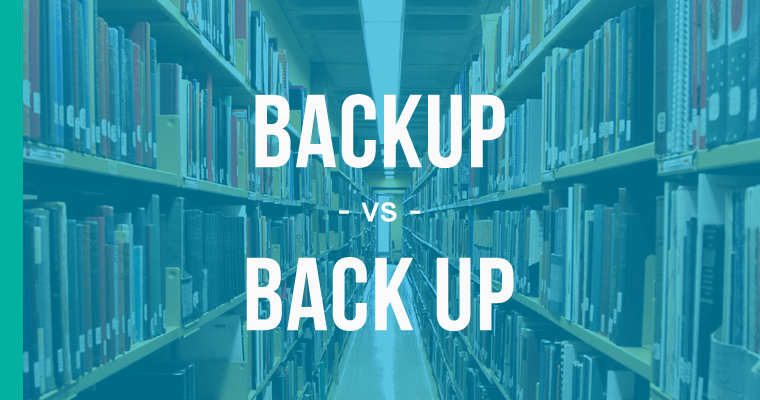Backup vs. Back Up – How to Use Each Correctly

What is the Difference Between Backup and Back Up?
Contents
Backup and back up sound the same, with the exception of a slight pause between the two words in back up. However, the two terms have different grammatical rules since they are different parts of speech, and they do not always share the same definition.
Backup is a noun with a few different definitions, including someone who supports someone else, an extra copy or source of something, or an accumulation of something. Sometimes backup can also act as an adjective.
- The police officer requested backup. (noun)
- The backup singers all wore glittery dresses. (adjective)
Back up is a phrasal verb. It also has several definitions, which include to accumulate too much, to support, or to reinforce.
- The flow of traffic always backs up near this exit.
Let’s go over the specific ways to use each of these terms so you don’t mix them up.
Using Backup in a Sentence
When to use backup: Backup is a noun that most often appears in the context of police and singers. It refers to the additional police officers who come in to support the police officers who were already at the scene of the crime and the singers whose voices add support to the lead singer.
Another common context is that of computer data. Backup data is data stored in another location in case the primary source of data gets lost or corrupted. In that same sense, backup can refer to any secondary item or thing that can act as a substitute for the main thing. It can also mean an accumulation of something.
For example,
- The officer called for backup when she realized it was a hostage situation.
- I spilled coffee all over my laptop and broke it, but luckily I keep an online backup of all my important files.
This word originated in the second half of the 1700s.
Using Back Up in a Sentence
When to use back up: Back up is a phrasal verb that has a few different definitions. These include to move backwards, to accumulate or to cause to accumulate, to create a copy of something in case the original is lost or damaged, and to support or reinforce.
For example:
- The hiker backed up quickly when he saw the bear.
- The herd of buffalo in the middle of the highway backed up traffic for miles.
- If you are writing an important essay you need to be sure to back it up in a secure location.
- The judge didn’t believe the witness’s testimony until several other witnesses backed her up.
Back up did not have the definition of creating a duplicate copy until the second half of the 1900’s.
Remembering Backup vs. Back Up
One way to remember the difference between backup, the noun, and back up, the phrasal verb is to think of other common nouns and phrasal verbs. Almost all nouns are a single word. Likewise, almost all phrasal verbs are two words.
Another way to help you remember is to put a word between back and up. For example, if you aren’t sure whether to write I’ll back up the data or I’ll backup the data, try moving the object between back and up. Since I’ll back the data up still makes sense, you know the two words are separable.
For the sense of move backwards, which doesn’t usually have an object, try substituting back away. If back away, which consists of two words, makes sense, then use back up as two words.
Outside Examples
- Starter Jay Cutler’s backup will be David Fales, who has thrown five passes in his NFL career. Cutler has gone the distance in only two of the past six games because of injuries, and Moore started in last week’s loss at New England. –USA Today
- But the right wing of the House Republican conference scuttled the deal, leading to a two-step backup plan: a bipartisan “supercommittee” tasked with cutting the deficit, and automatic spending cuts (sequestration) if the supercommittee failed. –Washington Post
- While there may be few fates worse than losing one’s home to floodwaters, far too many Houstonians don’t even have the luxury of struggling to climb back up the ladder. Instead they’ve been tossed off entirely, barely able to grasp the bottom rung. –Houston Chronicle
- MacKinnon and McDavid are equally dominant in carrying the puck through the neutral zone or accepting a pass in that area to force defenders to back up and not try to hold their blue line. –Denver Post
Quiz: Backup vs. Back Up
Instructions: Fill in the blank with the correct word, either backup or back up.
- It’s dangerous to go into that neighborhood without __________.
- I lost the original as well as the ___________.
- _________________! It’s about to explode!
- This whole traffic _______________ is just because everyone is trying to get a good luck at the accident on the other side of the road.
Article Summary
Should I use backup or back up? Despite all the similarities between these two terms, remember that they are different parts of speech.
- Backup is a noun that usually means support for someone, a duplicate, or an accumulation of something.
- Back up is a phrasal verb that usually means move backwards, support someone, duplicate, or accumulate.
The phrasal verb form is more common than the noun form.
Quiz Answers
- backup
- backup
- Back up
- backup
